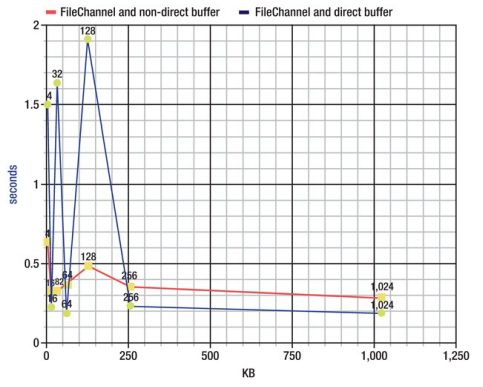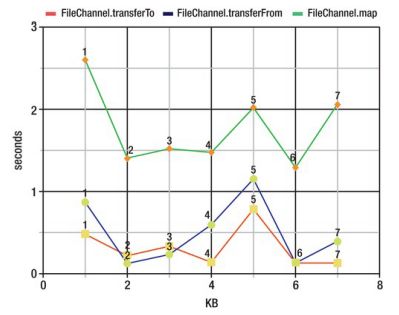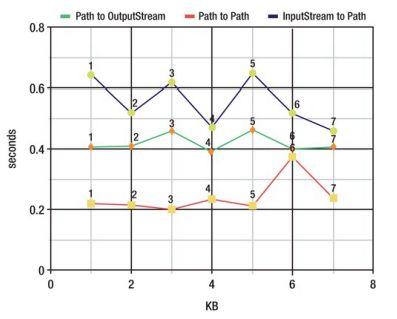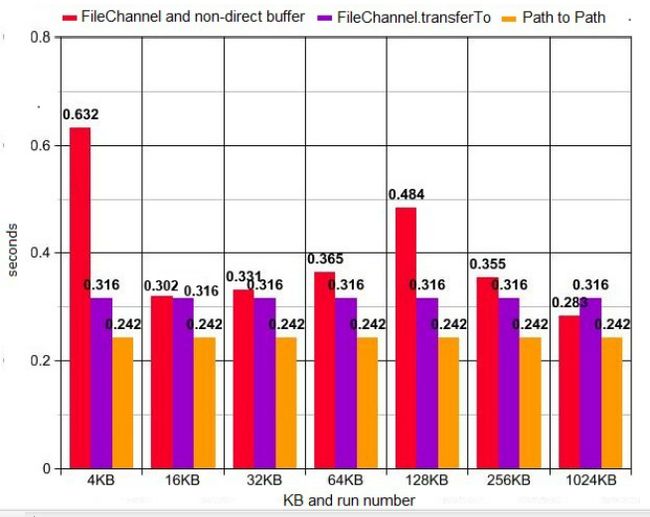Java 复制大文件方式FileChannel 用法
目前为止,我们已经学习了很多 Java 拷贝文件的方式,除了 FileChannel 提供的方法外,还包括使用 Files.copy() 或使用字节数组的缓冲/非缓冲流。那个才是最好的选择呢?这个问题很难回答,因为答案基于很多因素。本文将目光集中到一个因素,那就是速度,因为拷贝任务 越快将会提高效率,在有些情况下,这是成功的关键。因此,本文将使用一个应用程序来比较下面这些拷贝方式的具体时间:
- FileChannel 和非直接模式的 ByteBuffer
- FileChannel 和直接模式的 ByteBuffer
- FileChannel.transferTo()
- FileChannel.transferFrom()
- FileChannel.map()
- 使用字节数组和缓冲流
- 使用字节数组和非缓冲流
- File.copy()(Path 到 Path,InputStream 到 Path 和 Path 到 OutputStream)
应用程序基于下面的条件:
- 拷贝文件类型 MP4 视频(文件名为 Rafa Best Shots.mp4,所在目录为 C:\rafaelnadal\tournaments\2009\videos)
- 文件大小:58.3MB
- 测试的缓冲区大小:4KB, 16KB, 32KB, 64KB, 128KB, 256KB, and 1024KB
- 机器配置:Mobile AMD Sempron Processor 3400 + 1.80 GHz, 1.00GB RAM, 32-bit
OS, Windows 7 Ultimate - 测量类型:使用 System.nanoTime() 方法
- 连续运行三次后再获取时间;前三次运行将会被忽略。开始运行的时间总会比后面运行的时间要长一些。
下面将列出完整的应用程序:
|
1
2
3
4
5
6
7
8
9
10
11
12
13
14
15
16
17
18
19
20
21
22
23
24
25
26
27
28
29
30
31
32
33
34
35
36
37
38
39
40
41
42
43
44
45
46
47
48
49
50
51
52
53
54
55
56
57
58
59
60
61
62
63
64
65
66
67
68
69
70
71
72
73
74
75
76
77
78
79
80
81
82
83
84
85
86
87
88
89
90
91
92
93
94
95
96
97
98
99
100
101
102
103
104
105
106
107
108
109
110
111
112
113
114
115
116
117
118
119
120
121
122
123
124
125
126
127
128
129
130
131
132
133
134
135
136
137
138
139
140
141
142
143
144
145
146
147
148
149
150
151
152
153
154
155
156
157
158
159
160
161
162
163
164
165
166
167
168
169
170
171
172
173
174
175
176
177
178
179
180
181
182
183
184
185
186
187
188
189
190
191
192
193
194
195
196
197
198
199
200
201
202
203
204
205
206
207
208
209
210
211
212
213
214
215
216
217
218
219
220
221
222
223
224
225
226
227
228
229
230
231
232
233
234
235
236
237
238
239
240
241
242
243
244
245
246
247
248
249
|
import
java.nio.MappedByteBuffer;
import
java.io.OutputStream;
import
java.io.InputStream;
import
java.io.BufferedInputStream;
import
java.io.BufferedOutputStream;
import
java.io.File;
import
java.io.FileInputStream;
import
java.io.FileOutputStream;
import
java.io.IOException;
import
java.nio.ByteBuffer;
import
java.nio.channels.FileChannel;
import
java.nio.file.Files;
import
java.nio.file.Path;
import
java.nio.file.Paths;
import
java.nio.file.StandardOpenOption;
import
java.util.EnumSet;
import
static
java.nio.file.LinkOption.NOFOLLOW_LINKS;
public
class
Main {
public
static
void
deleteCopied(Path path){
try
{
Files.deleteIfExists(path);
}
catch
(IOException ex) {
System.err.println(ex);
}
}
public
static
void
main(String[] args) {
final
Path copy_from = Paths.get("C:/rafaelnadal/tournaments/
2009
/videos/
Rafa Best Shots.mp4");
final
Path copy_to = Paths.get(
"C:/Rafa Best Shots.mp4"
);
long
startTime, elapsedTime;
int
bufferSizeKB =
4
;
//also tested for 16, 32, 64, 128, 256 and 1024
int
bufferSize = bufferSizeKB *
1024
;
deleteCopied(copy_to);
//FileChannel and non-direct buffer
System.out.println(
"Using FileChannel and non-direct buffer ..."
);
try
(FileChannel fileChannel_from = (FileChannel.open(copy_from,
EnumSet.of(StandardOpenOption.READ)));
FileChannel fileChannel_to = (FileChannel.open(copy_to,
EnumSet.of(StandardOpenOption.CREATE_NEW, StandardOpenOption.WRITE)))) {
startTime = System.nanoTime();
// Allocate a non-direct ByteBuffer
ByteBuffer bytebuffer = ByteBuffer.allocate(bufferSize);
// Read data from file into ByteBuffer
int
bytesCount;
while
((bytesCount = fileChannel_from.read(bytebuffer)) >
0
) {
//flip the buffer which set the limit to current position, and position to 0
bytebuffer.flip();
//write data from ByteBuffer to file
fileChannel_to.write(bytebuffer);
//for the next read
bytebuffer.clear();
}
elapsedTime = System.nanoTime() - startTime;
System.out.println(
"Elapsed Time is "
+ (elapsedTime /
1000000000.0
) +
" seconds"
);
}
catch
(IOException ex) {
System.err.println(ex);
}
deleteCopied(copy_to);
//FileChannel and direct buffer
System.out.println(
"Using FileChannel and direct buffer ..."
);
try
(FileChannel fileChannel_from = (FileChannel.open(copy_from,
EnumSet.of(StandardOpenOption.READ)));
FileChannel fileChannel_to = (FileChannel.open(copy_to,
EnumSet.of(StandardOpenOption.CREATE_NEW, StandardOpenOption.WRITE)))) {
startTime = System.nanoTime();
// Allocate a direct ByteBuffer
ByteBuffer bytebuffer = ByteBuffer.allocateDirect(bufferSize);
// Read data from file into ByteBuffer
int
bytesCount;
while
((bytesCount = fileChannel_from.read(bytebuffer)) >
0
) {
//flip the buffer which set the limit to current position, and position to 0
bytebuffer.flip();
//write data from ByteBuffer to file
fileChannel_to.write(bytebuffer);
//for the next read
bytebuffer.clear();
}
elapsedTime = System.nanoTime() - startTime;
System.out.println(
"Elapsed Time is "
+ (elapsedTime /
1000000000.0
) +
" seconds"
);
}
catch
(IOException ex) {
System.err.println(ex);
}
deleteCopied(copy_to);
//FileChannel.transferTo()
System.out.println(
"Using FileChannel.transferTo method ..."
);
try
(FileChannel fileChannel_from = (FileChannel.open(copy_from,
EnumSet.of(StandardOpenOption.READ)));
FileChannel fileChannel_to = (FileChannel.open(copy_to,
EnumSet.of(StandardOpenOption.CREATE_NEW, StandardOpenOption.WRITE)))) {
startTime = System.nanoTime();
fileChannel_from.transferTo(0L, fileChannel_from.size(), fileChannel_to);
elapsedTime = System.nanoTime() - startTime;
System.out.println(
"Elapsed Time is "
+ (elapsedTime /
1000000000.0
) +
" seconds"
);
}
catch
(IOException ex) {
System.err.println(ex);
}
deleteCopied(copy_to);
//FileChannel.transferFrom()
System.out.println(
"Using FileChannel.transferFrom method ..."
);
try
(FileChannel fileChannel_from = (FileChannel.open(copy_from,
EnumSet.of(StandardOpenOption.READ)));
FileChannel fileChannel_to = (FileChannel.open(copy_to,
EnumSet.of(StandardOpenOption.CREATE_NEW, StandardOpenOption.WRITE)))) {
startTime = System.nanoTime();
fileChannel_to.transferFrom(fileChannel_from, 0L, (
int
) fileChannel_from.size());
elapsedTime = System.nanoTime() - startTime;
System.out.println(
"Elapsed Time is "
+ (elapsedTime /
1000000000.0
) +
" seconds"
);
}
catch
(IOException ex) {
System.err.println(ex);
}
deleteCopied(copy_to);
//FileChannel.map
System.out.println(
"Using FileChannel.map method ..."
);
try
(FileChannel fileChannel_from = (FileChannel.open(copy_from,
EnumSet.of(StandardOpenOption.READ)));
FileChannel fileChannel_to = (FileChannel.open(copy_to,
EnumSet.of(StandardOpenOption.CREATE_NEW, StandardOpenOption.WRITE)))) {
startTime = System.nanoTime();
MappedByteBuffer buffer = fileChannel_from.map(FileChannel.MapMode.READ_ONLY,
0
, fileChannel_from.size());
fileChannel_to.write(buffer);
buffer.clear();
elapsedTime = System.nanoTime() - startTime;
System.out.println(
"Elapsed Time is "
+ (elapsedTime /
1000000000.0
) +
" seconds"
);
}
catch
(IOException ex) {
System.err.println(ex);
}
deleteCopied(copy_to);
//Buffered Stream I/O
System.out.println(
"Using buffered streams and byte array ..."
);
File inFileStr = copy_from.toFile();
File outFileStr = copy_to.toFile();
try
(BufferedInputStream in =
new
BufferedInputStream(
new
FileInputStream(inFileStr));
BufferedOutputStream out =
new
BufferedOutputStream(
new
FileOutputStream(outFileStr))) {
startTime = System.nanoTime();
byte
[] byteArray =
new
byte
[bufferSize];
int
bytesCount;
while
((bytesCount = in.read(byteArray)) != -
1
) {
out.write(byteArray,
0
, bytesCount);
}
elapsedTime = System.nanoTime() - startTime;
System.out.println(
"Elapsed Time is "
+ (elapsedTime /
1000000000.0
) +
" seconds"
);
}
catch
(IOException ex) {
System.err.println(ex);
}
deleteCopied(copy_to);
System.out.println(
"Using un-buffered streams and byte array ..."
);
try
(FileInputStream in =
new
FileInputStream(inFileStr);
FileOutputStream out =
new
FileOutputStream(outFileStr)) {
startTime = System.nanoTime();
byte
[] byteArray =
new
byte
[bufferSize];
int
bytesCount;
while
((bytesCount = in.read(byteArray)) != -
1
) {
out.write(byteArray,
0
, bytesCount);
}
elapsedTime = System.nanoTime() - startTime;
System.out.println(
"Elapsed Time is "
+ (elapsedTime /
1000000000.0
) +
" seconds"
);
}
catch
(IOException ex) {
System.err.println(ex);
}
deleteCopied(copy_to);
System.out.println(
"Using Files.copy (Path to Path) method ..."
);
try
{
startTime = System.nanoTime();
Files.copy(copy_from, copy_to, NOFOLLOW_LINKS);
elapsedTime = System.nanoTime() - startTime;
System.out.println(
"Elapsed Time is "
+ (elapsedTime /
1000000000.0
) +
" seconds"
);
}
catch
(IOException e) {
System.err.println(e);
}
deleteCopied(copy_to);
System.out.println(
"Using Files.copy (InputStream to Path) ..."
);
try
(InputStream is =
new
FileInputStream(copy_from.toFile())) {
startTime = System.nanoTime();
Files.copy(is, copy_to);
elapsedTime = System.nanoTime() - startTime;
System.out.println(
"Elapsed Time is "
+ (elapsedTime /
1000000000.0
) +
" seconds"
);
}
catch
(IOException e) {
System.err.println(e);
}
deleteCopied(copy_to);
System.out.println(
"Using Files.copy (Path to OutputStream) ..."
);
try
(OutputStream os =
new
FileOutputStream(copy_to.toFile())) {
startTime = System.nanoTime();
Files.copy(copy_from, os);
elapsedTime = System.nanoTime() - startTime;
System.out.println(
"Elapsed Time is "
+ (elapsedTime /
1000000000.0
) +
" seconds"
);
}
catch
(IOException e) {
System.err.println(e);
}
}
}
|
输出结果排序比较复杂,其中包含了很多数据。下面我将主要的对比用图形的方式展示出来。图形中 Y 坐标表示消耗的时间(单位:秒),X 坐标表示缓冲的大小(或运行次数,跳过了前三次运行)。
FileChannel 和非直接模式 Buffer vs. FileChannel 和直接模式 Buffer
从下图看来,如果缓存小于 256KB,那么非直接模式的 Buffer 快一点,而缓存大于 256KB 后,直接模式的 Buffer 快一点:
FileChannel.transferTo() vs. FileChannel.transferFrom() vs. FileChannel.map()
从下图看来,FileChannel.transferTo() 和 FileChannel.transferFrom 运行七次的速度都差不多,而 FileChannel.map 的速度就要差很多:
三种 Files.copy() 方法
从下图看来,最快的是 Path 到 Path,其次是 Path 到 OutputStream,最慢的是 InputStream 到 Path:
FileChannel 和非直接模式 Buffer vs. FileChannel.transferTo() vs. Path 到 Path
最后,我们将前面最快的三种方式综合起来比较。从比较的结果来看,似乎 Path 到 Path 是最快的解决方案:



